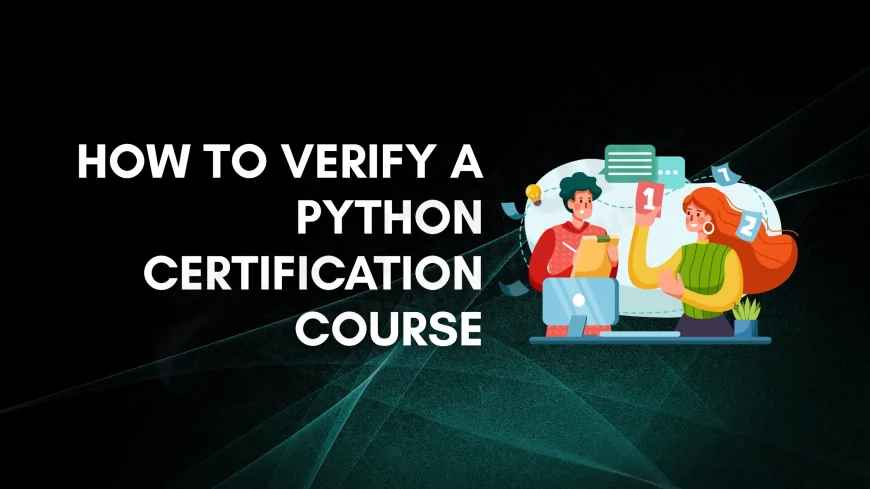How to Find Legit Python Certification Courses | A Complete Guide 2025
Looking for a legit Python certification course? Discover how to identify real, career-boosting Python training programs with verified credentials, hands-on projects, and long-term value—perfect for beginners and professionals.

In the rapidly expanding world of technology, Python has become one of the most sought-after programming languages due to its simplicity, versatility, and applications across a wide range of fields—from data science and web development to automation and artificial intelligence.
With this rising demand, many individuals—beginners and professionals alike—are seeking to validate their Python skills through certification courses. However, not all Python certification courses are created equal. The online space is flooded with options, making it increasingly challenging to distinguish between legitimate, career-enhancing certifications and low-value or even fraudulent offerings.
This comprehensive guide will help you understand what makes a Python certification course legit, how to evaluate course offerings, and how to avoid the traps of misleading or overpriced programs. Whether you’re just starting out or aiming to solidify your credentials, this blog will empower you to make smart decisions when choosing a Python certification.
Why a Legit Python Certification Matters
Before diving into how to find a legitimate certification, it's important to understand why it matters in the first place. A valid, well-regarded Python certification can:
-
Boost Your Resume: Hiring managers are more likely to favor candidates with industry-recognized credentials.
-
Validate Your Skills: Certification demonstrates a measurable level of competence in Python.
-
Improve Confidence: Knowing you've completed a rigorous program gives you a confidence boost.
-
Enable Career Switching: For non-technical professionals, a Python certificate can help break into tech.
-
Strengthen Practical Skills: Many good courses include hands-on assignments and real-world projects.
But all these benefits only come from courses that are genuine, up-to-date, and respected.
How to Identify a Legitimate Python Certification Course
There are clear indicators that help distinguish trustworthy certification programs from questionable ones. Below are the most important criteria to evaluate:
1. Transparency in Course Structure
A legitimate course clearly outlines its structure. This includes:
| Element | What to Look For |
|---|---|
| Curriculum | Detailed modules, lessons, and learning outcomes |
| Duration | Realistic timeline to complete the course |
| Assessment | Quizzes, projects, and exams to test comprehension |
| Tools & Technologies | Information on IDEs, libraries (e.g., Pandas, Flask), etc. |
Red flag: Courses that offer a "Python certification in 2 hours" or don’t reveal their curriculum upfront often lack depth.
2. Instructor Credibility
Although we’re not naming individuals or institutions, it’s essential that instructors have demonstrable experience. Look for:
-
Background in Python development or education
-
Evidence of previous teaching or industry experience
-
Feedback from former learners (more on that shortly)
Red flag: Anonymous instructors or lack of instructor profiles can indicate low-quality content.
3. Comprehensive Skill Coverage
A legitimate course should cover both theoretical concepts and practical implementation. Here’s what a well-rounded Python certification should include:
| Skill Type | Topics That Should Be Covered |
|---|---|
| Foundational | Variables, data types, loops, functions, error handling |
| Intermediate | File handling, OOP, modules, standard libraries |
| Advanced | Decorators, generators, unit testing, error debugging |
| Practical Projects | Mini applications, APIs, data analysis, automation scripts |
If a course skips essential Python topics and jumps directly into project-building or claims to make you an “expert” in a few hours, it’s likely superficial.
4. Real Assessments and Certification Process
Legit courses will assess you before issuing a certificate. This could be in the form of:
-
Final exams or quizzes
-
Coding challenges or project evaluations
-
Peer reviews or automatic grading systems
The certificate should not be issued merely for watching videos or logging in. Assessment is essential for credibility.
Red flag: “Instant certification” upon payment or after watching videos with no testing mechanism.
5. Recognition in the Industry
While we’re not relying on institutional names, you can still verify recognition in the following ways:
| Verification Method | What to Check |
|---|---|
| Learner Testimonials | Independent reviews, video feedback, or blog articles |
| Industry Forums | Discussions on Reddit, Stack Overflow, Quora |
| Alumni Success | Look for learners who transitioned into Python careers |
| Job Listings | Cross-reference with job listings asking for similar certifications |
If the course is repeatedly mentioned in industry conversations as reliable, it's likely legit.
6. No Overhyped Marketing
Authentic courses let the quality speak for itself. Avoid platforms that use:
-
Excessive use of buzzwords like “become a millionaire coder”
-
Unrealistic guarantees like “guaranteed job in 7 days”
-
Pressure tactics like “only 5 seats left!” for online courses
Marketing should be informative, not manipulative.
7. Real-World Projects and Portfolios
Legit courses encourage learners to build real-world projects to apply Python skills. These could include:
-
A web scraper
-
A data visualization dashboard
-
A REST API
-
A to-do list web app
-
An automation script for file management
A certification course that includes portfolio-worthy projects adds long-term value and shows practical learning.
8. Platform or Hosting Reputation
While we’re not naming specific platforms, do consider the overall reputation of the hosting platform:
-
Is the platform known for educational content?
-
Does it allow ratings and reviews that can’t be manipulated?
-
Can you preview the course or take a free trial?
Third-party hosting environments with good standing add credibility to the certification being offered.
9. Post-Certification Support
Legitimate Python certification courses don’t just end with a PDF certificate. Some value-added offerings to look for:
-
Continued access to materials
-
Access to learner communities or forums
-
Update alerts when the course is refreshed
-
Career or resume guidance (even if not job placement)
10. Security and Payment Transparency
Always check for:
-
Secure payment gateways (HTTPS, verified checkout pages)
-
Transparent pricing without hidden fees
-
Clear return/refund policies
-
Contact support availability
If something feels shady or ambiguous during checkout, it’s better to walk away.
Examples of What a Legit Python Course Might Include
Here is a table that outlines what you might expect from a strong, legitimate certification offering:
| Feature | Expected Standard |
|---|---|
| Duration | 4–12 weeks depending on depth |
| Access | Lifetime or extended access to materials |
| Format | Video lessons, readings, projects |
| Support | Forum or community support, optional mentoring |
| Final Project | At least one portfolio-grade project |
| Grading | Automated or manual assessment before certification |
| Certificate | Printable, shareable, with verification link |
How to Avoid Fake or Low-Quality Python Certifications
While the above section covers what to look for, it’s equally important to understand warning signs of fake or low-value courses:
-
No coding required: How can a programming certification not involve actual programming?
-
Clickbait titles: “Learn Python in 1 Day and Get Certified!” is a red flag.
-
No real reviews: Look for independent, unfiltered feedback from past students.
-
Hard-selling tactics: Pressure to buy now without giving you a preview or clear outline.
-
Poor design: Courses that have typos, outdated Python versions, or broken videos indicate lack of maintenance.
FAQ's
1. How can I identify a legitimate Python certification course in Pune?
Look for courses that offer a comprehensive curriculum, experienced instructors, hands-on projects, and recognized certifications. Institutes providing placement assistance and positive student reviews are also indicators of legitimacy.
2. What are the career benefits of completing a Python certification in Pune?
A Python certification can open doors to roles in web development, data science, AI, and automation. It validates your skills, making you a competitive candidate in Pune's thriving IT job market.
3. Do Python training institutes in Pune offer placement assistance?
Yes, many institutes provide placement support, including resume building, interview preparation, and job referrals, to help students secure positions in reputable companies.
4. What course highlights should I look for in a Python certification program?
Key highlights include a structured curriculum covering basics to advanced topics, real-world projects, interactive sessions, and assessments to track progress.
5. Are there flexible learning options available for Python courses in Pune?
Absolutely. Many institutes offer flexible schedules, including weekend and evening batches, as well as online and offline learning modes to accommodate different needs.
6. How long does it typically take to complete a Python certification course?
The duration varies but generally ranges from 1 to 3 months, depending on the course's depth and the student's learning pace.
7. What is the average fee for Python certification courses in Pune?
Fees can range from INR 8,000 to INR 95,000, depending on the institute, course content, and additional services like placement assistance.
8. Do these courses cover advanced Python topics?
Yes, comprehensive courses delve into advanced topics like object-oriented programming, data structures, libraries (e.g., Pandas, NumPy), and frameworks like Django.
9. Is prior programming experience required to enroll in a Python course?
Not necessarily. Many courses are designed for beginners and start with fundamental concepts, gradually progressing to advanced topics.
10. How do Python certifications enhance job prospects in Pune?
Certifications demonstrate your commitment and expertise, making you more attractive to employers seeking skilled Python developers in Pune's competitive IT industry.
11. Are there institutes in Pune that offer project-based Python training?
Yes, several institutes emphasize hands-on learning through real-world projects, enabling students to apply concepts and build a strong portfolio.
12. What kind of support do institutes provide post-course completion?
Post-course support often includes access to learning resources, alumni networks, job portals, and continued mentorship to assist in career advancement.
13. Can I pursue a Python course while working full-time?
Certainly. Many institutes offer part-time, weekend, or online courses tailored for working professionals seeking to upskill without disrupting their jobs.
14. Do institutes provide certifications upon course completion?
Yes, upon successfully completing the course and assessments, institutes award certifications that can be added to your resume and professional profiles.
15. How do I verify the credibility of a Python training institute in Pune?
Research the institute's history, read student testimonials, check placement records, and review the curriculum to assess its credibility.
16. Are there any prerequisites for enrolling in a Python certification course?
While some advanced courses may require basic programming knowledge, most beginner courses have no prerequisites and start from scratch.
17. What job roles can I pursue after obtaining a Python certification?
Roles include Python Developer, Data Analyst, Machine Learning Engineer, Web Developer, and Automation Tester, among others.
18. Do institutes offer demo classes before enrollment?
Many institutes provide free demo classes or trial periods, allowing prospective students to experience the teaching style and course content.
19. How important is it to choose an institute with experienced faculty?
Experienced instructors bring industry insights and practical knowledge, enhancing the learning experience and better preparing students for real-world challenges.
20. Can I learn Python online if I can't attend classes in Pune?
Yes, numerous institutes offer comprehensive online Python courses with live sessions, recorded lectures, and virtual labs, providing flexibility for remote learners.
Unlocking Opportunities with Python
Finding a legitimate Python certification course is not just about choosing the most popular or the most expensive one. It's about carefully evaluating the curriculum, transparency, delivery quality, and long-term value.
A good Python certification should give you more than a piece of paper—it should give you skills, confidence, and tangible proof of your programming ability. Whether you're preparing for a new job, a career switch, or just expanding your knowledge, make sure the certification you choose is respected, recognized, and rigorously earned.
Invest your time and money wisely. With the right course, your Python certification can open doors to a successful and sustainable tech career.
What's Your Reaction?
 Like
0
Like
0
 Dislike
0
Dislike
0
 Love
0
Love
0
 Funny
0
Funny
0
 Angry
0
Angry
0
 Sad
0
Sad
0
 Wow
0
Wow
0















